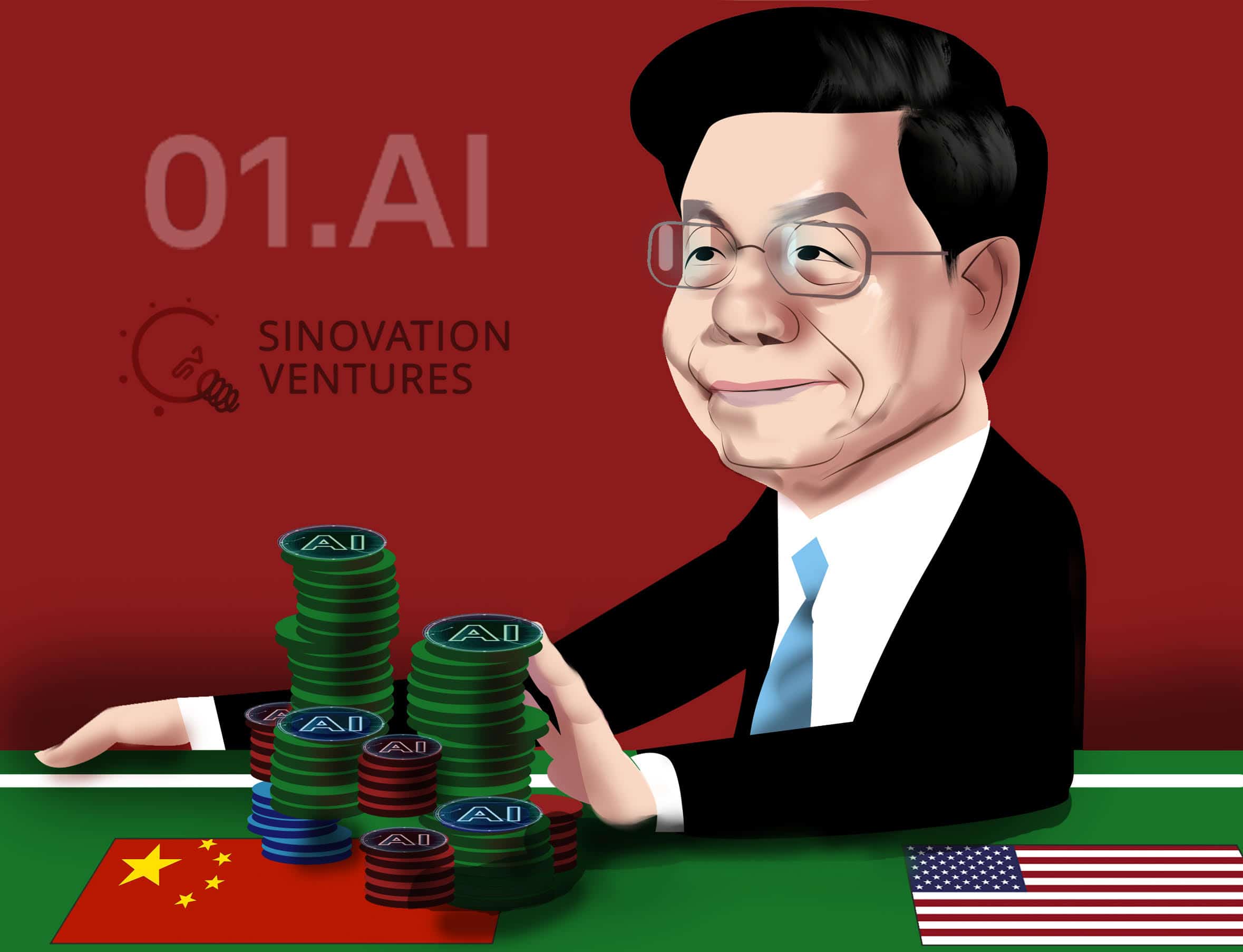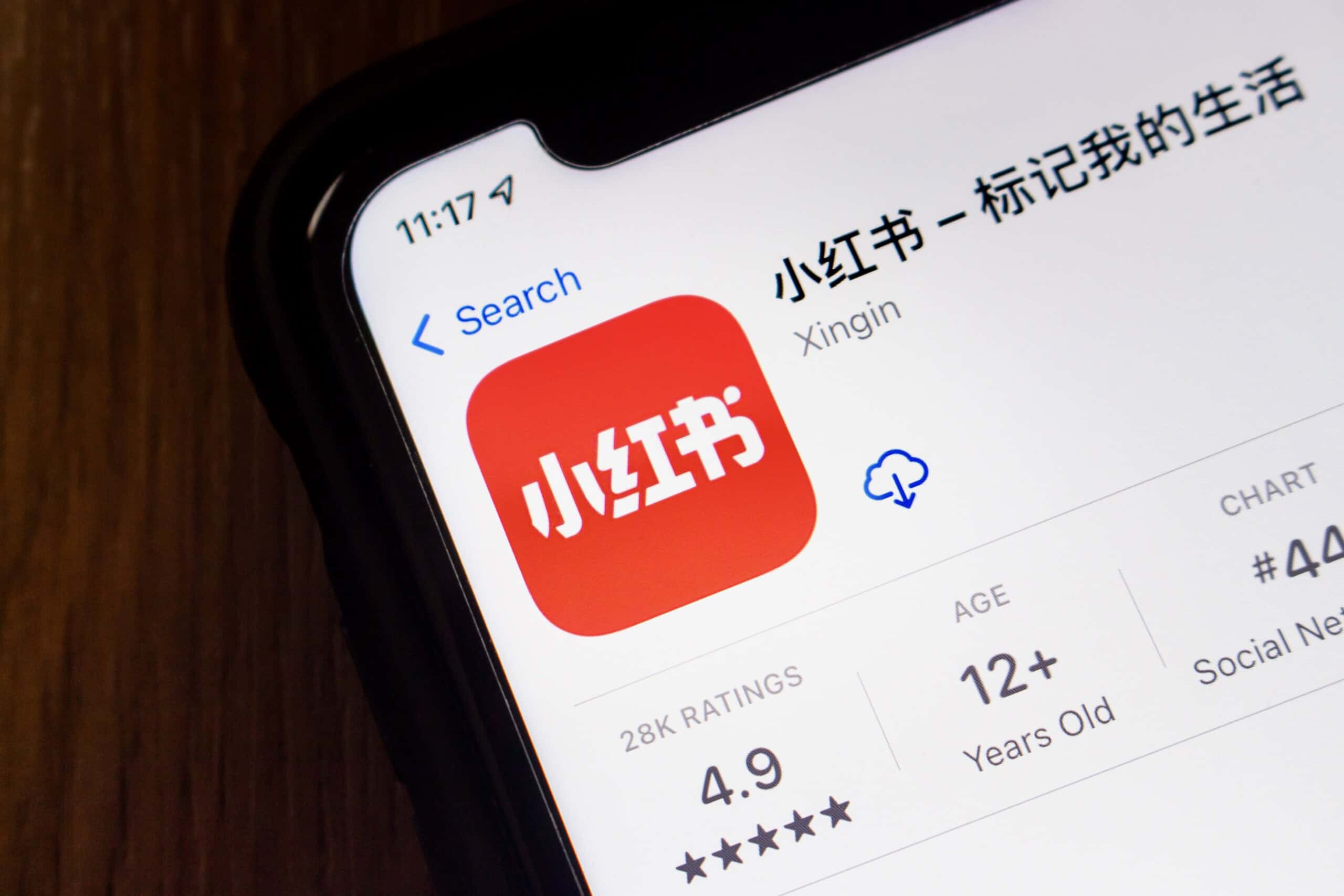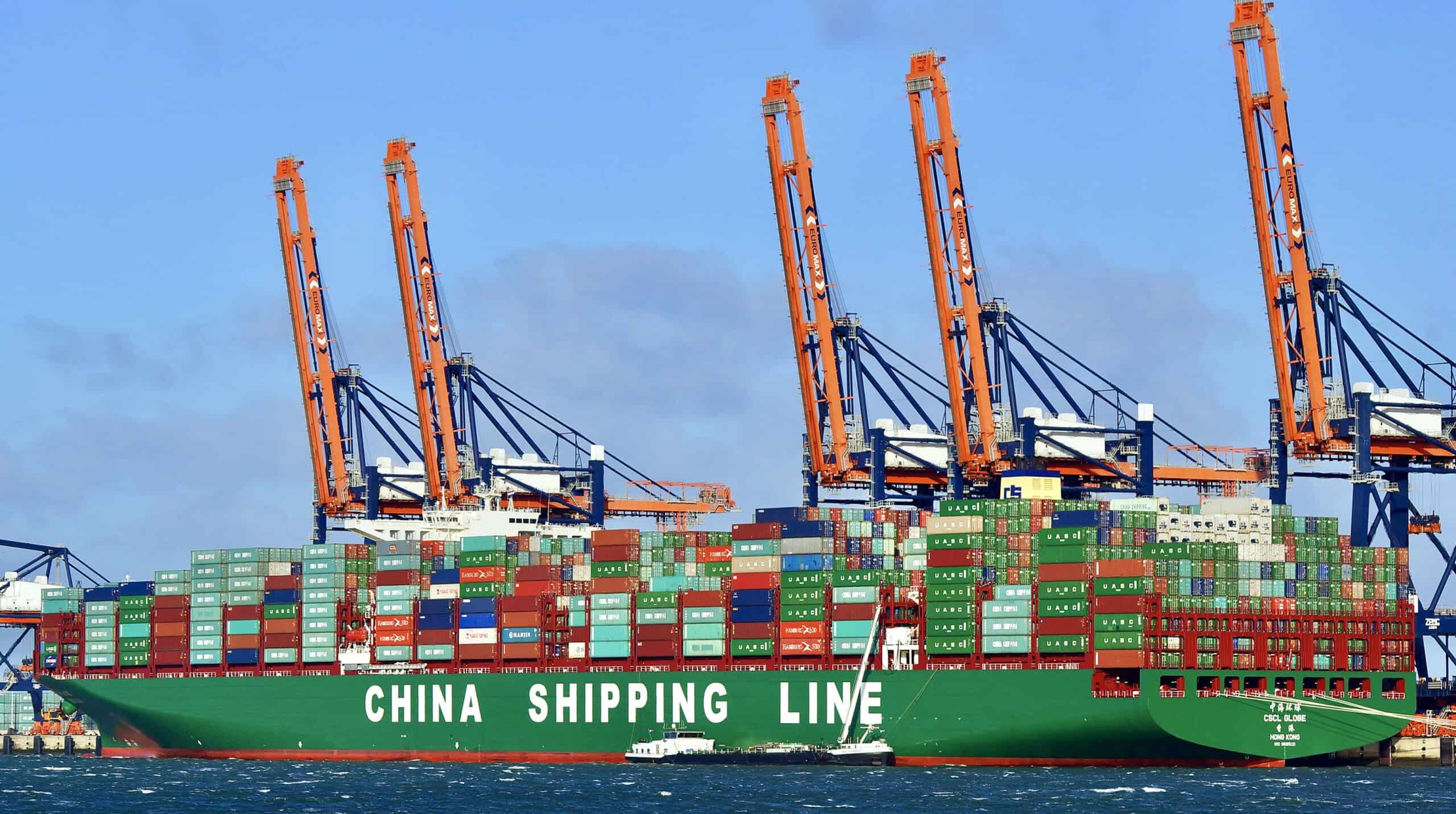During his long career, mostly as a journalist, Mark Clifford has been the editor in chief of the South China Morning Post and an executive director of the Asia Business Council among other roles. He was also a board member at Next Digital, parent company of pro-democracy newspaper Apple Daily, until it shut down in 2021. He is currently the president of the Committee for Freedom in Hong Kong Foundation, which seeks to free all political prisoners in the city. His new book, The Troublemaker: How Jimmy Lai Became a Billionaire, Hong Kong’s Greatest Dissident, and China’s Most Feared Critic, looks at the life story of the media mogul who is currently on trial for collusion with foreign forces and sedition.
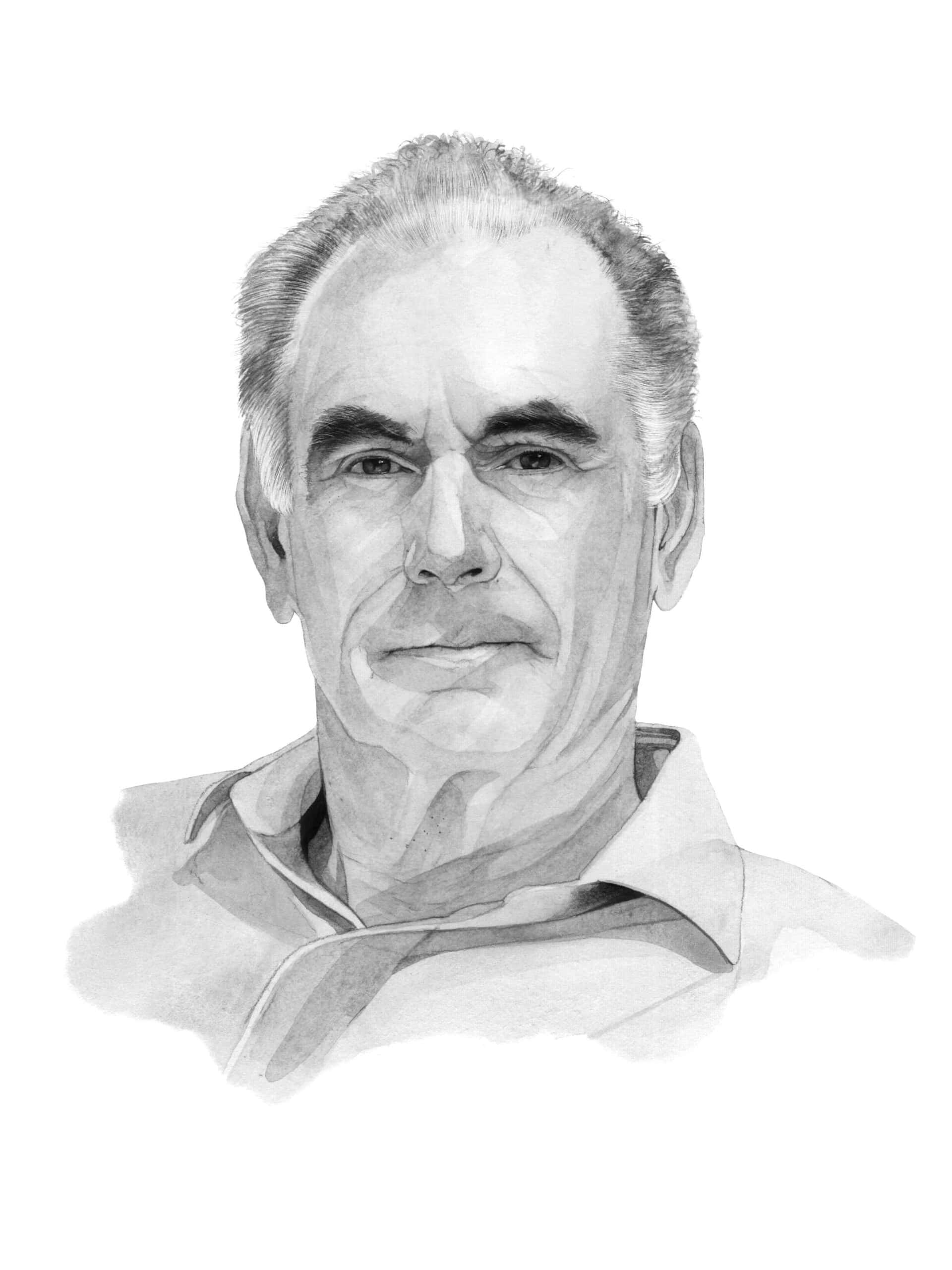
Illustration by Kate Copeland
Q: In the prologue to your book, you say that you never expected to write one about Jimmy Lai. What changed your mind?
A: Jimmy Lai was put in jail four years ago. He and I had been doing a lot of weekly live stream events through the second half of 2020. I was angry and exasperated, but I was also in disbelief. I couldn’t understand how the [Hong Kong authorities] could throw this guy in jail for basically practicing journalism. I thought, let’s try to organize and keep the spotlight on Jimmy, and they’ll let him out with the Beijing Winter Olympics coming up, as they wouldn’t want to have a lot of political prisoners in Hong Kong. Well, I was naive and wrong, but that’s how it got started.
How did you first come to know Lai?
I’m a recovering journalist. I moved to Hong Kong in 1992 and was working for the Far Eastern Economic Review, as an industry correspondent. I was fascinated by the city and its entrepreneurial culture, and somebody suggested that I go meet this guy, Jimmy Lai. I called and arranged an interview and his secretary said, he wants to invite you to lunch. He invited me to his house on Tai Po Road, overlooking the harbor. And he actually cooked lunch for me: a Chinese stir fry rice, veggies and shrimp. At that point, he’d started Next Magazine a few years before, but he had yet to start Apple Daily. He walked me through why this was going to be a great business opportunity.
| MISCELLANEA | |
|---|---|
| FAVORITE BOOK | The Brothers Karamazov, Fyodor Dostoevsky |
| FAVORITE FILM | Give Me Liberty |
| FAVORITE MUSIC | Beethoven’s Fidelio |
| MOST ADMIRED | Alexei Navalny, Jimmy Lai, Natan Sharansky |
Then in 2018, I joined the board of Next Digital. And because of that, I felt a particular responsibility to try to do something when our majority shareholder and [former] executive chairman was put in jail.
Can you tell us about Lai’s background? How did he become a publisher, and what is really extraordinary about his upbringing?
One of the most remarkable things I learned from research for the book was what an incredible entrepreneur he is. Hong Kong is filled with good businessmen, but he’s really much more than that. He started out in the clothing business. First he worked in a glove factory as a child laborer. By the mid 1970s, he owned a clothing factory. He described himself as the biggest sweater manufacturer in Hong Kong, and by extension, probably one of the biggest in Asia. Then he started Giordano, the clothing retailer. Here’s a guy who has made his first millions. He’s moving around in a Rolls Royce. He’s got a pet bear in the backyard and lots of other animals, living out the crazy rich Asian fantasy, and thinking about his next business.

And then the 1989 protests in Beijing started, and he was so taken by them. He had been optimistic about Chinese economic reforms, which started under Deng Xiaoping in the 1980s. When he saw these students he thought, we’re going to have political and social freedom as well. And he started selling democracy T-shirts in support of the protesters. He put the faces of three student leaders, Wang Dan, Wu’er Kaixi, and Chai Ling, on T-shirts, sold them in Giordano shops in Hong Kong, and sent the proceeds to students in Beijing.
Then came the killings of June 4. And he was just devastated. He got a cold call from an aide to Martin Lee [founding chairman of Hong Kong’s largest opposition Democratic Party], who brought him to meet Lee. Jimmy promised to do what he could to support the Democratic Party, but he wanted to run a business. He’s not a politician or a political leader. And he thought, I read the Economist and Fortune, I watch CNN, I can start a magazine.

Next Magazine, which started in March 1990, nine months after the Tiananmen killings, got off to a slow start, but within a couple years, it was a huge success in Hong Kong. When I met him in autumn of 1993, Next Magazine had already turned the corner. Hong Kong is a city of seven and a half million people, where six out of 10 people consistently vote for the pro-democracy camp. And yet, you’ve got newspapers owned by tycoons and business people who, in most cases, have other business interests, and in any event, do not want to run afoul of the Chinese Communist Party. Jimmy said, I’ll have a great product. And nobody else is going to dare to be as brave and pro-democracy and even anti-CCP as I will be.
What is the reputation of Apple Daily and Next Magazine in Hong Kong? In what ways is the outlet a pioneer and why was it controversial?
Next was set up in 1990 and Apple Daily came along in 1995. They both had a ‘take no prisoners’ approach. Most magazines at that time were narrowly focused. They did entertainment or business. And Jimmy said, I’m going to put them all together: food, culture and lifestyle with top-notch economists, horse racing and investigative reporting.

He paid his staff well and he paid for quality. He got the best investigative reporters. Next had this cutting edge aspect that nobody could deny. It exposed corruption and political deals, and at the same time, had celebrity gossip. Apple Daily was the same, but on steroids. Jimmy invested very heavily in printing presses. He was the first one to use color in newspapers in Hong Kong.
But to your point about controversy, Apple Daily went to the edge and sometimes beyond, especially in the early years. Apple had a column that rated restaurants, but it also rated prostitutes on Portland Street. The most notorious case was a man whose wife had killed herself with their two kids, and Apple Daily not only chronicled but actually financed the crazy, drunken, sex-filled frenzy that this guy went on in Shenzhen. So there was a really prurient aspect. Jimmy in time moved the newspaper away from that sort of salacious coverage. By the turn of the century, it had changed a lot.
What role did Apple Daily play in advancing the cause of democracy in Hong Kong over the decades, and particularly during the protests in 2019?

It always had a pro-democracy agenda. He wanted the Hong Kong and Chinese authorities to live up to the promises that they’d made to the people of Hong Kong and to the international community under the Basic Law and under the Sino-British Joint Declaration in 1984. Those promises said that Hong Kong would be able to keep a high degree of autonomy and its traditional freedoms for the next 50 years. It would have its own currency, its own taxes, its own administrative civil service system, but it would also have all the freedoms that Hong Kong people were used to — rule of law, freedom of speech, of press, of assembly, and of religious worship. It wasn’t that Jimmy or Apple Daily or Next were asking for something special.
As it became clear that China was not living up to its promises, and that its idea was to have a sham democracy where you might have elections as long as the Chinese Communist Party knew that it would win, Jimmy, Apple Daily, and its journalists were forced into a situation where they either have to cave or fight for the people of Hong Kong.
In 2003, when Hong Kong authorities tried to put through the Article 23 legislation, which said that Hong Kong needed to enact its own homegrown National Security Law, Apple had taken a leading role in getting people out on the streets. I don’t think Jimmy or anyone would have imagined that 500,000 people would come out on the streets on July 1, 2003 to protest the legislation, but it was Apple and Next that helped crystallize that event. After that, the publications shifted tone. Jimmy and others on the publications realized that they had a broader social, and even political, role to play.
Fast forward to the Umbrella Movement in 2014, Jimmy camped out for every one of those 79 days in front of his tent, along with many students. He was out there on the front lines. He took on a more visible role personally in the movement, as opposed to just being behind the scenes, or at the newspaper, or donating money to opposition political parties. And the newspaper became the go-to source for information. The paper had an enormous impact because of the readership and scale. We were selling hundreds of thousands of copies a day.
Jimmy and Apple Daily played a powerful supporting role [in the movement], but he never had the intention to take political leadership or seize political control. And that’s probably hard for the Chinese authorities to understand…
I do have to say that he tried to restrain young activists against using violence. Jimmy has always been a consistent exponent of non-violence. One of the most important instances was when he was in Washington DC in 2019 with Martin Lee, and they ran across John Lewis, the revered civil rights icon. Jimmy stopped him and said, “can we make a video to the students of Hong Kong, asking them to stick with non-violence?” It was just a fortuitous meeting in the halls of Congress, but Jimmy saw John Lewis and wanted him to get that message of non-violence across to the students.

Jimmy and Apple Daily played a powerful supporting role [in the movement], but he never had the intention to take political leadership or seize political control. And that’s probably hard for the Chinese authorities to understand, because the media is always an extension of the CCP in traditional communist practice. And Jimmy and Apple, they were really their own thing.
One thing that stands out about Jimmy Lai is that while most businessmen tend to align with Beijing, he has remained a staunch critic. Why do you think that’s the case?
I think it’s his character. I asked him a few years ago, why do you do this? He said, I guess I’m just a troublemaker. His character was forged in fires that you and I just can’t imagine. He was born a year before Mao took power in China to a wealthy family that lost everything in the communist takeover, came to Hong Kong illegally as a stowaway at the age of 12 to escape famine in China, and spent his first night in Hong Kong in a factory because there was nowhere else for him to sleep.
Given what he went through and the fact that he survived, he has enormous confidence and doesn’t want anybody else telling him what to think. But it was Hong Kong that gave him this concept of freedom. And he felt that he had to stay and protect that because the city gave him everything.
What are the current charges against him? And what is the narrative that the Hong Kong and Chinese authorities are trying to push about Jimmy Lai?

I don’t quite understand the charges honestly. They seem to be about collusion with foreign forces, because he had met people like John Lewis or former vice president Mike Pence, or former secretary of state Mike Pompeo, or national security advisor John Bolton or Nancy Pelosi when she was Speaker of the House. As Matt Pottinger [a former national security advisor to the Trump administration] pointed out to me, Tung Chee-hwa [former chief executive of Hong Kong] was in the White House a lot more than Jimmy Lai was. It’s normal that people go to other countries and talk to officials. It’s what people do in open society to try to get their point of view across. In this case, it was freedom for Hong Kong.
But the narrative seems to be that somehow he was this evil mastermind who got a couple of million Hong Kong people out to protest in 2019 and was convincing Hong Kong people that they should have something that, as far as Chinese are concerned, they don’t deserve and aren’t ready for. And that’s freedom.
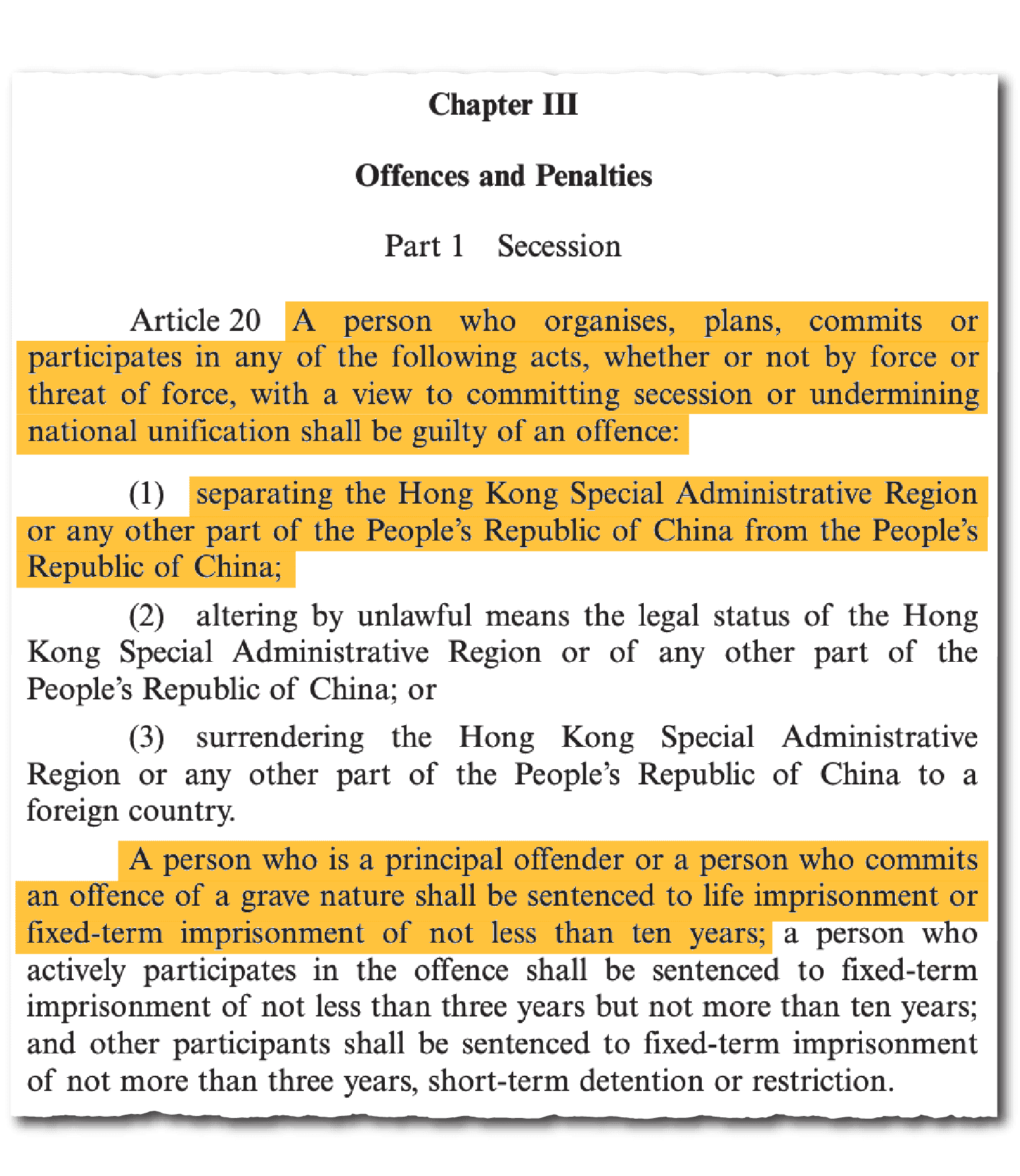
The Chinese authorities are really mad because they expected that Hong Kong people would buckle, that they could be bought off, bribed, bullied, controlled, and beaten, and one way or another, they’d knuckle under to Beijing, even if they didn’t like it. The stubbornness of the Hong Kong people has presented a real conundrum for the CCP.
Many people have said the national security law [imposed by Beijing in 2020] was actually written with Jimmy in mind. I don’t know if that’s true, but Jimmy does have four attributes, which make him a particularly potent adversary in the CCP’s eyes. First of all, he’s rich, so he can do whatever he wants. He had a megaphone in the form of a media company. And he believes in democracy. He’s also a Catholic, a man who’s willing to suffer for his principles. He wants to get out, he wants to leave Hong Kong, but he’s ready to die rather than surrender.
How is his situation in jail right now? And what do you think will be the outcome of the trial?
I think he’ll be found guilty. It’s a sham trial because the judges clearly are out to convict him, as they have convicted most national security law defendants. For a while the current Secretary of Security, Chris Tang, was able to boast of a 100 percent conviction rate, which is not really the kind of thing you usually like to boast about, because it only happens in a totalitarian society.

He will get a lengthy sentence. That’s when groups like ours and others will step up our activities to work for a political solution for Jimmy’s release. He has so much international support that eventually Xi Jinping is going to find out it’s more trouble to have him in prison, potentially dying in prison, than it will be to let him out and let him spend his last years with his family in peace. Apple Daily’s presses are not going to be running again, so I don’t think China really has a lot to worry about.
I have no direct knowledge, but it’s quite well established that he’s been in solitary confinement for almost all of the more than 1,400 days he has spent in the maximum security Stanley Prison, a late 1930s British colonial prison. I understand he’s had problems with heat rashes in the summer. Since he’s gone to prison, he has suffered from COVID and had cataract surgery. He is a long-time diabetic. He’s an aging man who is not in great health, and it’s made a lot worse by the prison conditions.
He’s typically put in chains when he’s transferred to the court for his trial, accompanied by an extraordinarily heavy police presence. They put him in an armored car, and often inside a cage while chained. It’s kind of a joke, because he’s a man of non-violence who deliberately chose to stay and speak truth to power.

What do you think his case tells us about the current situation of Hong Kong?
It underscores how much freedom has evaporated in Hong Kong and how the authorities’s main concern seems to be clamping down on any perceived dissent, whether it’s a threat or not. It tells us something very sad about a place that still calls itself Asia’s world city and used to be one of the world’s greatest financial centers, rivaling London and New York — and yet, now it jails one of the greatest entrepreneurs of his generation. It’s a reflection of how far Hong Kong has fallen. Instead of celebrating somebody like Jimmy, or the 45 civic leaders [recently sentenced to jail for holding an informal primary election], you take your best and your brightest, whether they’re lawyers, journalists, professors or business people, and lock them up and deny society everything that they could create. That is the Hong Kong of today.

In modern history, outside of a war, I don’t think we’ve seen a faster destruction of freedom than what we’ve seen in Hong Kong in the last five years, from being one of the freest, most open cities in the world to one of the most repressive. It has seen over 1,900 political prisoners put behind bars in the last five years, from almost none before that. In terms of the growth and the number of new political prisoners, that ranks up there with countries like Belarus and North Korea.
You point out in the book that Lai has found more champions on the right wing of the American and British political spectrums than on the left. Why do you think that that is the case?
Jimmy has a lot of support among more conservative circles, partly because he’s a radical free market proponent. He’s been a Trump supporter. He’s spoken to people on both sides of the aisle in the U.S. But as a businessman, as somebody who speaks the language of economic freedom, and as a Catholic, he finds himself more comfortable with more conservative circles in the U.S. and the UK.

We’ve had really great bipartisan support, especially in the U.S. Congress. Democrats like Representatives Nancy Pelosi, Tom Suozzi, and Jim McGovern, and Senator Jeff Merkley are among Jimmy’s strongest supporters in Congress. But I’m sorry to say that, in general, more liberal media just have a hard time understanding the threat that the Chinese Communists pose in Hong Kong and elsewhere. A lot of progressives are more focused on problems at home in the U.S. So it’s been harder to get their attention, especially if they caricature Jimmy as a right-wing businessman who supports Trump, rather than a torch-bearer for press freedom and democracy.
But it goes beyond Jimmy. It’s been surprising to me that the Hong Kong 47 now hasn’t gotten more attention. This is just a grave human rights violation. Why more progressives haven’t adopted their cause is something we need to reflect on a lot here in the States and in the UK.

Why is Lai’s story relevant to the world, and what more can foreign governments do to help his situation?
His story, just as that of Hong Kong, is relevant because what Xi Jinping and the Chinese Communist Party are trying to do in Hong Kong today is effectively a version of the blueprint they have for the world and for free societies everywhere. If the world just capitulates on Hong Kong, it’s a green light for Xi to move on Taiwan — and beyond, even influencing politicians and media in free societies like Canada, the UK, Australia, and New Zealand.
In terms of how they’ve taken an open society and undercut it, we see similar tactics — bribing, controlling, and bullying — throughout Southeast Asia. For instance, in ASEAN, China has an outsized influence in the media debate. It’s telling newspapers that they can’t report on Taiwan or Hong Kong issues in a certain way.
Jimmy, Apple Daily and Next Magazine, and all the many thousands of journalists who worked there over three decades embody this spirit of freedom and openness that to me still typifies what’s so great about Hong Kong, and which I believe still lives in Hong Kong people’s hearts.
I also think that Hong Kong is really important because it has emerged as a major center for sanctions evasion. Hong Kong has traded on its reputation, which it earned over decades, as a trusted partner in counter-terrorism and other security issues. Unfortunately now, a lot of high-tech materiel that’s being used for the Russian war effort is going through Hong Kong, so there are security implications as well. We have to start considering Hong Kong as a national security threat.

You mentioned that you would want to look for a political solution for Jimmy Lai. Is there any room for compromise? Or do you think his fate right now is inevitable?
I think he’ll be sentenced to what’s effectively a life sentence, since he is in his late 70s. My understanding is he’d have a sentence at a minimum of 10 years and a maximum of life. From how I see it, there has to be a political solution. I’ve been encouraged to see that China has been releasing wrongfully detained Americans, including pastor David Lin and three other wrongfully detained Americans recently. China could potentially be willing to make a deal. President elect Trump has said that he would “100 percent get Jimmy Lai out,” that it would be very easy. Jimmy Lai is also a British citizen. And [British Prime Minister] Keir Starmer spoke out forcefully about his fate when he met Xi Jinping [in November].
Both sides, the free world and China, are going to need to accommodate each other. None of us want war or conflict. Both sides are looking for negotiations and guardrails. From a Chinese standpoint, I can’t think of a move that has a lower cost and higher potential reward. Letting Jimmy Lai out does not hurt China’s national security. I don’t know what a trade might look like, but we’re seeing signs of movement and a growing outcry around the world.
How would you describe the status of press freedom in Hong Kong right now?
My answer is very short: What press freedom? There’s no press freedom in Hong Kong now. There’s room within very narrow guardrails to report very narrowly. Just to give you an example, when the Committee for Freedom in Hong Kong Foundation comes out with research or statements, the press in Hong Kong are afraid to report it. Whatever you think of our work, it’s a legitimate source of news and interest, and editors would like to run it, and yet they can’t for fear they might somehow be tangled up with a foreign force.
But strangely, I remain optimistic. I believe Hong Kong people are just biding their time. And we see some of them, when they support Jimmy by lining up in a typhoon outside the courthouse or wearing a T-shirt that might get them thrown in jail. Freedom is in the Hong Kong DNA and Jimmy helped create that freedom. Jimmy, Apple Daily and Next Magazine, and all the many thousands of journalists who worked there over three decades embody this spirit of freedom and openness that to me still typifies what’s so great about Hong Kong, and which I believe still lives in Hong Kong people’s hearts.
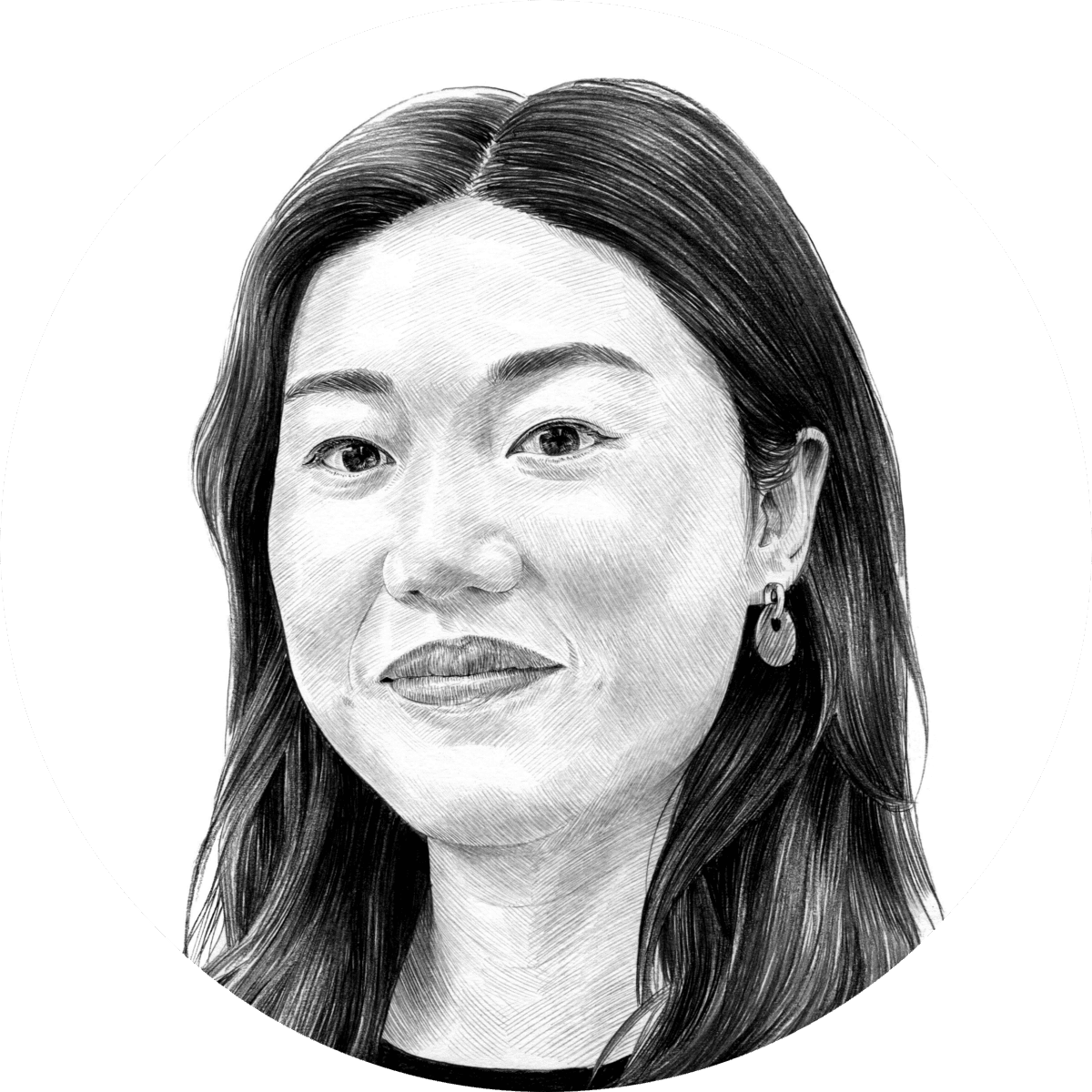
Rachel Cheung is a staff writer for The Wire China based in Hong Kong. She previously worked at VICE World News and South China Morning Post, where she won a SOPA Award for Excellence in Arts and Culture Reporting. Her work has appeared in The Washington Post, Los Angeles Times, Columbia Journalism Review and The Atlantic, among other outlets.


